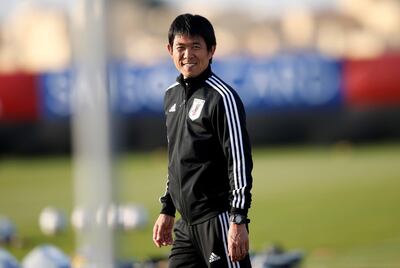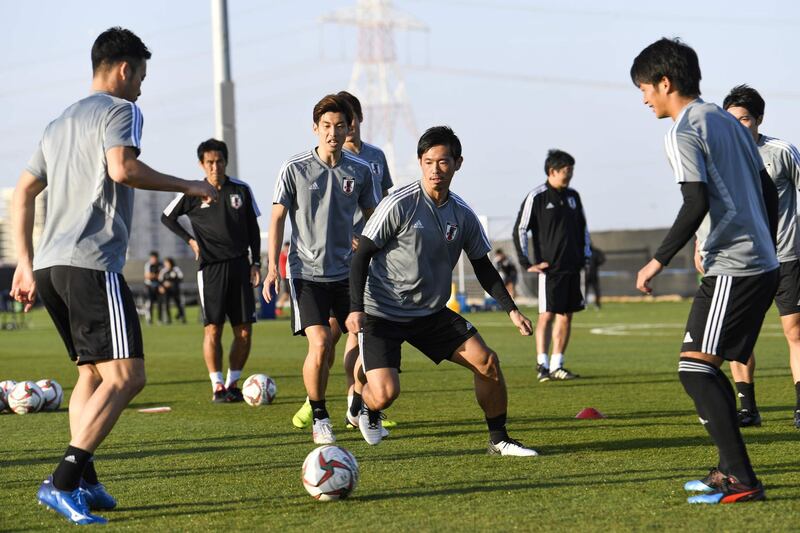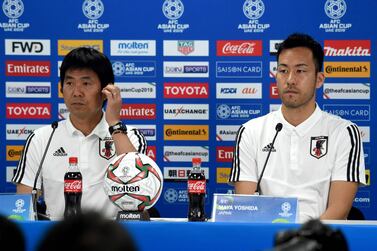Seven months after Japan matched their best ever finish at a World Cup, they aim to celebrate a rapid rebirth by reconfirming their status as their continent’s top national side.
They were Asia's best at Russia 2018. In Rostov on July 2, they produced a proactive and bold performance in perhaps the most thrilling fixture of the tournament, a see-saw 3-2 loss against Belgium in which they had been two goals up.
That day, elimination felt especially harsh, and if it was rewarding to hear a global audience praise the Japanese players for their gumption and skill, it was also time to draw a curtain. The team who line up on Friday in pursuit of the country’s fifth Asian Cup title will look very distinct from the warriors of Rostov.
Take a head-count: to compare those who were there and those who will be standing in line for the national anthems at Zayed Sports City Stadium for Friday’s final is to see something like an evolution.
The 11 who were on the pitch, distraught after having watched a 94th-minute counter-attack snatch Belgium a spot in the quarter-finals as Japan bowed out, included just five of the men who were on the field, ready to celebrate, when the final whistle blew in Al Ain at the end of their 3-0 Asian Cup semi-final win over Iran.
That is quite a turnover: Samurai Blue becomes Samurai New.
"Winning the #AsianCup is a source of pride!"
— #AsianCup2023 (@afcasiancup) January 31, 2019
🇯🇵 @YutoNagatomo5 is feeling relaxed ahead of the #AsianCupFinal thanks to 2011 experience. pic.twitter.com/HyLBRfN8vg
It is not that there was great deal wrong with the troupe of players who guided Japan to within 16 minutes of a place in the World Cup’s last eight. But it was the oldest squad, on average, the country had ever taken to a World Cup.
Strategic calculations about the endurance of some of the veterans were framed by the unique current circumstances around Japanese sport: There is an Olympics going to the islands in 18 months' time, and the men’s football component of the Games, with its upper age limits, will be a highlight event.
Hence the dual role assigned to manager Hajime Moriyasu, who took over the senior team from Akira Nishino after a World Cup at which he had been part of the staff. He is also in charge of preparing the Under 23s, who will be the basis of the Olympic team, IOC rules allowing three squad members at the Games to be over 23.

The squad at this Asian Cup does not have a long list of players born after 1996, but those who are of that age have impressed. Takahiro Tomiyasu’s authority, initially at the base of midfield, and, later in tournament, at centre-back, has been eye-catching.
He is 20, as is the winger Ritsu Doan, whose goals against Turkmenistan - a curling shot after a dainty pirouette - in Japan’s tournament opener, and against Vietnam - a penalty in a pressure situation - in the quarter-final have been crucial to progress through the tournament.
Both made their senior Japan debuts last August, part of a fresh wave of players Moriyasu brought in. Meanwhile, the worldly, long-serving and globetrotting stars such as Shinji Kagawa, Keisuke Honda, Makoto Hasebe, Shinji Okazaki and goalkeeper Eiji Kawashima were eased aside.
Some of those may yet come back into consideration - though Hasebe and Honda have retired from international football - but they know now they will have to work hard for a recall.
Moriyasu, a former international, and an Asian Cup winner in 1992, does not style himself a revolutionary, and talks of the blend he has cultivated between youth and experience, and a beneficial transition. Witness Tomiyasu, who has learned from partnering Maya Yoshida, the captain set to earn his 95th cap on Friday.
Yoshida has enjoyed watching the various freshmen around him grow wiser as footballers in the last four weeks, a journey that began with a scare - the narrow, 3-2 win over Turkmenistan - and then showed a gathering control and maturity, with four clean sheets in the subsequent five matches.
🇯🇵 Gaku Shibasaki feels huge responsibility to create history ahead of #AsianCup2019 final.
— #AsianCup2023 (@afcasiancup) January 30, 2019
Can the @jfa_samuraiblue make it 5⃣ continental titles? pic.twitter.com/zAFIcreIv7
“It’s important for younger players to take responsibility when they are representing their country,” believes Yoshida, the Southampton defender, “but I try to make sure they are comfortable and confident, and I want them to enjoy the final.”
Yoshida will know exactly how the newcomers are feeling, too.
Eight years ago, he was a 22-year-old playing in an Asian Cup final, and finishing on the winning side, having played his first competitive international only a few weeks earlier.
His expert advice to the juniors? “Enjoy the ride, and be champions.”







